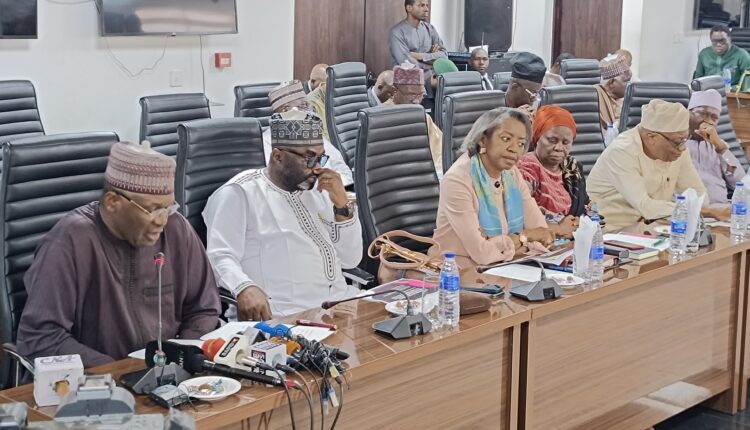
Nigeria’s electoral body, the Independent National Electoral Commission (INEC), today welcomed a high-level delegation from the ECOWAS Network of Electoral Commissions (ECONEC) tasked with evaluating the country’s implementation of recommendations stemming from the 2023 General Elections.
The post-election follow-up and needs assessment mission, led by Mrs. Davidetta Browne-Lansanah, Chairperson of Liberia’s National Elections Commission (NEC), and including Dr. Bossman Asare, Deputy Chairman of Ghana’s Electoral Commission, aims to track progress on reforms proposed by the ECOWAS Election Observation Mission (EOM).

INEC Chairman, Prof. Mahmood Yakubu, formally received the delegation at the commission’s Abuja headquarters. In his opening remarks, Yakubu framed the mission as a “routine practice but very critical to electoral democracy in our region,” highlighting Nigeria’s recent participation in a similar review in The Gambia.
A central theme of Yakubu’s address was the shared responsibility for electoral integrity. He revealed that the ECOWAS EOM made 37 distinct recommendations following the February and March 2023 polls. Crucially, only 13 were directed at INEC itself.
“The Commission is glad that ECOWAS… recognises that election is a multi-stakeholder responsibility,” Yakubu stated. The remaining 24 recommendations target other key Nigerian institutions, including:
✓ The National Assembly (requiring legislative action)
✓ The Nigeria Police Force (NPF)
✓ The National Broadcasting Commission (NBC)
✓ The National Information Technology Development Agency (NITDA)
✓ Civil society organisations
✓ The Nigeria Union of Journalists (NUJ)
✓ Political parties (via the Inter-Party Advisory Council – IPAC)
The ECONEC mission is also scheduled to meet with the National Identity Management Commission (NIMC).
Regarding the 13 recommendations specifically for INEC, Yakubu reported that the commission had “considered all the recommendations that require administrative action to implement.” However, he noted progress on recommendations needing legislative change is contingent on the ongoing legal review by the National Assembly.
INEC provided the delegation with detailed responses to the 13 observations, asserting that most align with the commission’s own 142 recommendations for electoral reform. These reform proposals, developed through consultations and available publicly on INEC’s website, address perceived shortcomings from the 2023 polls. Hard copies of the election report, reform recommendations, and INEC’s response to ECOWAS were distributed to the mission members.
Yakubu acknowledged the role of international partners facilitating the mission, including experts from the Electoral Institute for Sustainable Democracy in Africa (EISA), the International Institute for Democracy and Electoral Assistance (IDEA), and the German development agency GIZ. He also commended the ECONEC Secretariat for its professionalism.
The INEC Chairman expressed anticipation for a “robust interaction” during the mission’s stay, emphasising the shared goal of strengthening electoral processes across West Africa.
The outcome of the ECONEC assessment is keenly awaited, as it provides an external evaluation of Nigeria’s progress in addressing challenges observed during its last major electoral cycle, seen as crucial for bolstering confidence in future polls. The spotlight now falls on both INEC’s administrative actions and the responsiveness of other national institutions, particularly the legislature, to the required reforms.


